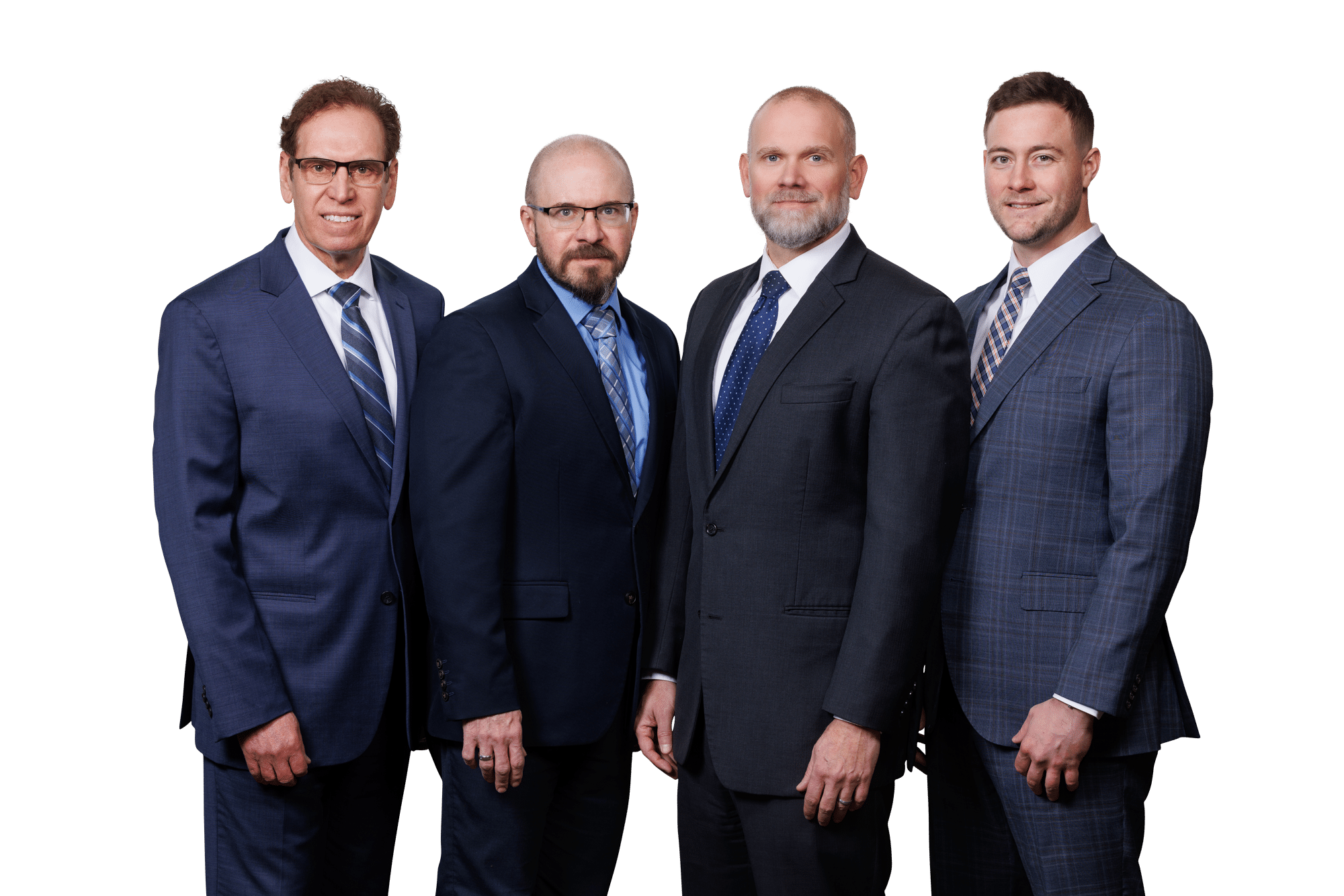
Grand Junction Workers Compensation Lawyer
Our law firm has an extensive background in obtaining positive outcomes for workers’ compensation claims. At Killian, Davis, Richter & Fredenburg, PC we have received many favorable rulings from the Colorado Court of Appeals and the Colorado Supreme Court in workers’ compensation cases. For our experienced lawyers, these victories mean more than just courtroom success; each one represents a worker with a head, neck, shoulder, or back injury who was able to get needed and deserved compensation. It is a record of achievement in which we take great pride.
Our Grand Junction, Colorado, law firm is a member of the Workers’ Compensation Education Association. Because of our extensive background in workers’ compensation claims and our reputation for success in Western Colorado workers’ comp, our personal injury lawyers are able to settle most claims quickly and efficiently.
- Reasonable and necessary medical care
- Temporary total disability
- Permanent partial disability
- Repetitive stress injuries
We can help you with many aspects of your workers’ compensation claim, including discussing a plan of action, filing the initial claim, handling administrative appeals, and pursuing any necessary federal appeals. We aim to assist people who have been injured get the proper medical care to help them get better. We strive to help families cope financially with the lost earnings and difficult times that can sometimes result from a work-related injury.
COLORADO WORKERS’ COMPENSATION FREQUENTLY ASKED QUESTIONS
Q: I WAS INJURED ON THE JOB. I WANT TO SEE MY OWN DOCTOR, BUT MY EMPLOYER SAID THAT I HAVE TO GO TO THE DOCTOR THEY DESIGNATE. IS THAT CORRECT?
A: Under the Worker’s Compensation laws, the employer has the right to select a treating physician for an injured employee. If you are injured on the job, you must first report your injury in writing and ask your employer whether the company has selected a physician for workers’ compensation injuries. That authorized physician may then refer you to other medical providers who also may provide medical treatment. Any doctor or medical specialist within that chain of referral is authorized and medical bills will be paid by the workers’ compensation insurance carrier if the claim is admitted or if the administrative law judge determines the injury is work related.
If the employee does obtain treatment from a doctor that is not authorized by the employer, the employee will be responsible for payment of those medical bills. If the employer does not refer you to a physician or denies the claim, then the employee has the right to select his or her own physician. If you would like to discuss your case with one of our experienced lawyers, please telephone. Under a percentage fee agreement, there are no attorney fees unless we obtain benefits for you.
Q. I WAS INJURED AT WORK AND MY EMPLOYER WILL NOT AGREE TO LET ME SEE MY DOCTOR OR SEND ME TO A COMPANY DOCTOR. WHAT CAN I DO ABOUT THIS?
A: First, to ensure your rights are protected, you must give your employer written notice of your injury within four days of the occurrence. Under Colorado law, verbal notice to your supervisor or employer is not sufficient even if your supervisor is present when the injury occurs. If you fail to give this written notice, you may lose one day of benefits for each day after the first four days that you fail to give notice. You can still give written notice after four days and receive workers compensation benefits, but those benefits may be reduced.
Second, in all cases of work related injury, the employer or the insurer has the right to select the physician. However, if the services of a physician are not offered at the time of the injury, the employee then has the right to select a physician. If your employer refuses to send you to a doctor, you may then see the doctor of your choice.
If your employer or insurer denies coverage, you will probably need to file an application for hearing. At the hearing you will ask a judge to order your employer to pay for the doctor’s services.
Q. I SUSTAINED A SERIOUS INJURY AT WORK. THE WORK COMP INSURANCE ADJUSTER SAID THAT THEY WOULD NOT PAY ME ANY MORE BENEFITS AND THAT THEY HAD FILED A FINAL ADMISSION OF LIABILITY (FAL). WHAT IS A FAL?
A: The FAL tells you whether the insurer is admitting for payment of your medical benefits after MMI and whether it will pay for your disfigurement (e.g., scars or a limp). It also states upon what percentage of impairment the insurer is basing its admission. If you disagree with anything in the FAL, or if want a DIME, you must object within 30 days or you may lose important rights and benefits.
A high percentage of the time, our clients receive additional money and medical benefits when they object to the FAL. Because timing is critical with FALs, you need to pay close attention to protect your rights. Call an attorney if you have questions or concerns.
Q. I WAS INJURED AT WORK AND I BELIEVE MY INJURY IS DUE TO THE NEGLIGENCE OF MY EMPLOYER. CAN I SUE MY EMPLOYER FOR NEGLIGENCE?
A: Generally, no. In the state of Colorado, if the employer has workers compensation coverage, the only remedy an employee has for a non-intentional injury occurring at work is provided under the Workers’ Compensation Act. Benefits under the Act include wage loss benefits, payment of medical bills, reimbursement for mileage to and from appointments, prescription medicine, disfigurement benefits, and a monetary award for any permanent impairment. Workers’ compensation benefits do not include compensation for pain and suffering or future vocational losses.
However, if an employee is injured during the course and scope of employment by the negligence or wrong of another who is not the direct employer or a co-employee, the injured employee may receive workers’ compensation benefits and also pursue a third party claim against the at-fault party.
For example, if an employee is injured in a car accident while working, the employee may receive workers’ compensation benefits and also, along with the workers<‘ compensation carrier, bring an action against the at-fault driver.
Q. MY DOCTOR RESTRICTED ME FROM GOING TO WORK FOR THREE WEEKS BECAUSE OF A WORK INJURY. CAN MY EMPLOYER MAKE ME USE MY VACATION AND SICK TIME FOR THIS?
A: If you miss more than three days work, you are entitled to wage loss benefits starting on the fourth day through your employer’s workers’ compensation insurance. If you miss more than two weeks, you are entitled to wage loss benefits for every day missed due to the injury, including the first three days. If your employer forces you to use vacation pay or sick leave, the workers’ compensation insurance carrier must still pay you wage loss benefits. Therefore, you should get your regular pay for vacation or sick leave and, in addition, you would be paid workers’ compensation benefits.
To receive workers’ compensation benefits, you must give your employer written notice of your injury within four days of the occurrence. Verbal notice to your supervisor is not sufficient even if he or she was present when the injury occurred. If you fail to give this written notice, you may lose one day of benefits for each day that you fail to give notice after the first four days. You can still give written notice after four days and receive workers’ compensation benefits, but those benefits may be reduced.
If you have experienced an injury in a work accident, contact our workers’ compensation attorneys at (970) 241-0707. We offer free and confidential initial consultations to help you understand your rights under workers’ compensation law.
